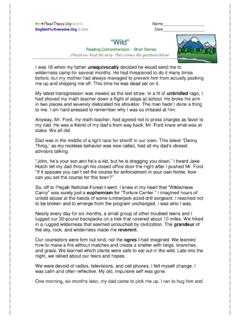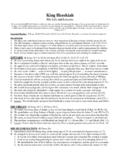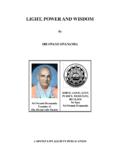Transcription of God’s Compassion, Our Compassion Jonah 4:1-11 - Faith
1 God s Compassion , Our Compassion Jonah 4:1-11 This may be a bit uncomfortable, but I d like to begin by having you bring to mind your enemies. I m using the term rather broadly. In the NT, the noun enemy comes from the verb to hate or have hostility toward. Your enemies are those whom you hate/dislike or those with whom you have hostility/conflict. They re not necessarily bad people; they may even be fellow believers. But who are the people you dislike or the people with which you have hostility? Your enemies could be people that are out to get you in some way in your family, in the workplace, in the community. Or perhaps your enemies stand in the way of what you want to do (or even what God wants you to do).
2 Instead of encouraging you, they discourage you. Or your enemy may be somebody who hurt you deeply at some time in the past either intentionally or unintentionally. Or perhaps there s a whole class or category of people that you don t particularly like. It could be people of another nationality, people of another world religion, or people of another political persuasion from you. As you know, we usually feel very justified in disliking our enemies; after all, they re our enemies. But Jesus tells us, Love your enemies and pray for those who persecute you. Today we finish up our study in the book of Jonah . Jonah 4 is really a case study in loving our enemies.
3 Jonah had great antagonism toward his enemies (the Ninevites). But God wouldn t let it go in relation to loving his enemies; God forced Jonah to come face to face with the fact that he didn t love his enemies. Jonah 4 brings us face to face with the question of whether or not we will love our enemies. I don t really have a hot tip for finding the book of Jonah this week. But I discovered that if you Google finding Jonah you ll find a bunch of sermon series on Jonah where they ve changed the Finding Nemo logo to Finding Jonah . I m not sure if it s legal, but it s sort of clever (and cheesy). God confronts Jonah s attitude toward his enemies.
4 ( Jonah 4:1-11 ) At the end of chapter 3 we read that when God saw the repentance of the people of Nineveh, He relented concerning the judgment He had threatened. God in His sovereignty has the freedom to change His mind in this way. As a result, this massive Assyrian city was spared God s judgment. Notice Jonah s response in 4:1. 1 But it greatly displeased Jonah and he became angry. Jonah s greatest fear was that Nineveh would repent and that God would relent concerning the judgment He had promised. And God had forced him ( Jonah ) to be the instrument of His Compassion toward the Ninevites; they repented in direct response to his proclamation to them.
5 This greatly displeased Jonah and he became angry. To his credit, Jonah did what you re supposed to do when you re angry: he prayed to God and laid out his complaint. No matter how misguided and muddled our thinking, it s always good to talk with God about what makes us angry. Jonah 4, FEFC, 6/6/10 Page 2 Stephen A. Ratliff 2 He prayed to the LORD and said, "Please LORD, was not this what I said while I was still in my own country? Therefore in order to forestall this I fled to Tarshish, for I knew that You are a gracious and compassionate God, slow to anger and abundant in lovingkindness, and one who relents concerning calamity. I love the honesty of Jonah in this prayer.
6 He actually admits that he tried to forestall God s Compassion toward the people of Nineveh by fleeing to Tarshish. He would have preferred that they experience God s judgment, not His Compassion . Jonah quotes a portion of Exodus 34:6 (God s self-revelation to Moses) when he speaks of God being a gracious and compassionate God, slow to anger and abundant in lovingkindness. Of course Jonah didn t at all mind when God was gracious and compassionate to him when he found himself sinking to the bottom of the sea; but when it came to the Ninevites, God s Compassion and grace angered him. He didn t mind that God was patient with him ( slow to anger ), but he wanted God s anger to burn toward the Ninevites.
7 If we re honest, we all face this tension. We don t always want God to be as gracious toward our enemies as He has been toward us. Jonah felt the full weight of the tension between what he wanted and what God wanted. He knew that he was no match for God. If he fought with God, God would win every single time. Given that reality, Jonah says: 3 "Therefore now, O LORD, please take my life from me, for death is better to me than life." 4 The LORD said, "Do you have good reason to be angry?" Jonah echoes the words of Elijah in 1 Kings 19:4. There Elijah was running from Jezebel who sought to kill him. Sometimes the people who understand God the best find themselves in this type of personal, spiritual crisis because they see the issue so very clearly.
8 Jonah came to the point of preferring death to life because he knew that his will was at odds with God s will. That s a depressing, demoralizing realization. Since God would win every single argument, every single fight, Jonah wanted to give up. Some people can ignore God and pretend like everything s fine, but Jonah knew God too well to do that. And so he wanted to die. The other option, of course, was for Jonah to have a change of mind and change of heart. If he adopted God s Compassion toward the Ninevites, the tension would be gone; he wouldn t have to lose any more fights with God because he would now be on God s side. This is why Jesus taught His disciples to say to God, Your kingdom come, Your will be done, on earth as it is in heaven.
9 The only way to have peace and contentment in this life is to align your will with God s will. God s response to Jonah is simply a question: Do you have good reason to be angry (lit. hot )? God simply asks Jonah whether or not he really thought his anger was justified. We don t have Jonah s verbal response, but we do have recorded what he did next: 5 Then Jonah went out from the city and sat east of it. There he made a shelter for himself and sat under it in the shade until he could see what would happen in the city. The temperature in that part of the world can easily reach 110 during the summer. And so Jonah made some type of simple shelter (perhaps woven out of branches) that would provide some shade while he waited to see what would happen to Nineveh at the end of the 40 days.
10 Jonah 4, FEFC, 6/6/10 Page 3 Stephen A. Ratliff The Lord next gives Jonah an object lesson that drives home the point of the whole book of Jonah . This object lesson came in the form or a fast-growing plant 6 So the LORD God appointed a plant and it grew up over Jonah to be a shade over his head to deliver him from his discomfort. And Jonah was extremely happy about the plant. Back in 1:17 God appointed a fish to swallow Jonah . Here He appoints a plant to shade Jonah and give him some relief from his discomfort. Apparently the shelter he had made wasn t really doing the job. But Jonah was extremely happy about the plant. Jonah found great satisfaction in the plant that God had provided for his comfort.









